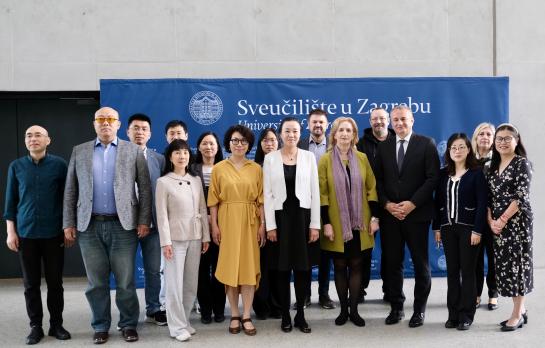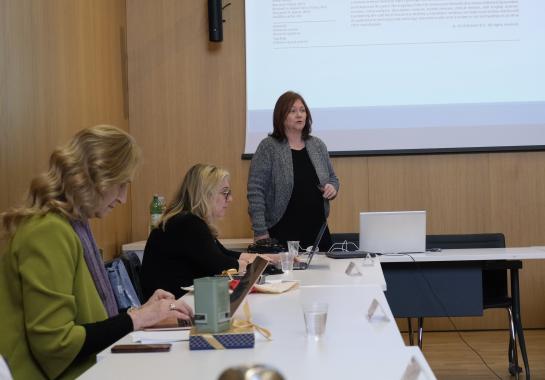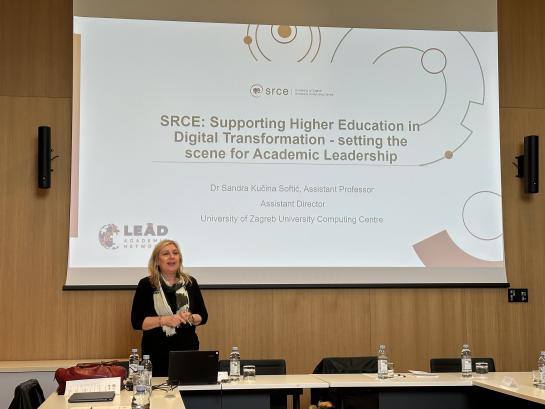
On 16 May 2025, the second part of the Young Academic and Digital Academic Leadership Development Program was successfully held at the University of Zagreb, Croatia. Jointly organized by the EU-China Higher Education Research Center at VUB, LEAD Academic Network and the University of Zagreb, this program brought together a delegation of faculty members from Shanghai University and academic representatives from University of Zagreb to engage in in-depth discussions on digital transformation and academic leadership in higher education.
In the opening session, Prof. Dr. Jurica Pavičić, Vice-Rector of the University of Zagreb, noted that several delegations from Chinese universities were visiting Zagreb this week, reflecting the increasingly close cooperation between Chinese universities and University of Zagreb in the fields of education and scientific research. He particularly emphasized that universities worldwide are jointly facing the major challenge of digital transformation, and that this training program serves as a timely and effective example of promoting EU-China cooperation and capacity building in higher education.
Prof. Dr. YU Xuemei, Vice President of Shanghai University, expressed her sincere appreciation to the University of Zagreb, ECHE at VUB, and the LEAD Academic Network for their thoughtful organization of the program. She noted that this training builds upon the successful first edition held in Brussels and Lisbon in 2024, and provides a valuable opportunity for young scholars to strengthen their leadership in a time of rapid change. She encouraged participants to engage actively, communicate openly, and apply what they have learned to their teaching and research practices, contributing to the advancement of their institutions and international cooperation.
During the morning session, the 2024 Annual Review Video of the LEAD Academic Network highlighted the recent achievements in international collaboration, training programs, and the development of young academic leadership. In addition, bilateral meetings were held between Shanghai University and the University of Zagreb to explore future cooperation opportunities.
Three keynote speeches and workshops were delivered during the program. Prof. Sandra Kucina Softic, Assistant Director of SRCE (The University Computing Centre), introduced how SRCE of UoZ supports Croatia’s digital transformation in higher education. She described artificial intelligence as “the tip of the iceberg,” emphasizing that beneath the visible technological surface lie numerous ethical, pedagogical, and institutional challenges. She called on leaders to adopt strategic foresight and a strong sense of responsibility when navigating digital change.
Prof. Markus Schatten highlighted that AI is a neutral tool whose impact depends on its usage. He raised concerns about hallucinations, plagiarism, and teacher anxiety, calling for ethical guidelines and institutional support. He also showcased open-source AI tools developed in his lab and urged academic leaders to take a proactive role in guiding responsible AI integration.
Prof. Mirjana Pejic Bach focused on how digital tools like VosViewer can support systematic literature reviews and visual data analysis. She offered a detailed explanation of methods such as keyword clustering. Through hands-on demonstrations, she encouraged young researchers to integrate digital tools into topic selection, research planning, and academic leadership.
After the keynote speeches, Prof. MOU Chengbo and Prof. LYU Yingchun from Shanghai University delivered their reflections on the one-week program they have attended. Drawing on their research experience, they shared reflections on digital governance, AI applications, and international cooperation. They emphasized that the program had broadened their strategic thinking and enhanced their intercultural communication skills.
The event concluded with closing speeches by Prof. Melita Kovačević, former Vice-Rector of the University of Zagreb, and Prof. YU Xuemei. Prof. Kovačević encouraged young scholars to continue strengthening their intercultural understanding and digital leadership skills, and to face the uncertainties of the time. Prof. YU expressed her sincere gratitude to the organizers, noting that the program not only offered valuable knowledge but also served as a catalyst for leadership development and academic responsibility. She expressed her hope for deeper collaboration with the LEAD Academic Network in the future.
At the closing ceremony, Prof. Melita Kovačević, Prof. YU Xuemei, and Prof. Dr. Chang Zhu (director of the EU-China Higher Education Research Center at VUB and coordinator of the LEAD Academic Network), jointly presented the certificates to all participants. This marked a successful conclusion to the cross-cultural academic leadership training event, injecting fresh vitality into higher education cooperation and underscoring the ECHE of VUB and LEAD Network’s commitment to advancing digital leadership in a global academic context.


